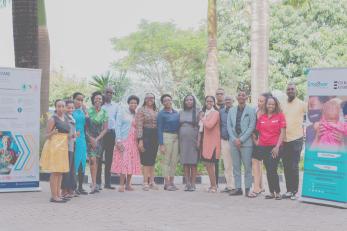Learning event explores advancements in women’s economic empowerment through financial access for clean cooking

On 22nd and 23rd May, Mercy Corps-Energy 4 Impact, in collaboration with Empower Rwanda, held an annual learning event in Kigali to assess the progress of the Financial Inclusion for Clean Cooking in Rwanda and Sierra Leone (FICCARS) programme. Funded by Jersey Overseas Aid, this initiative aims to advance the economic empowerment of women living and working in informal urban settlements through clean cooking solutions and financial services.
Participants, including government representatives, financial institutions, community leaders, and women beneficiaries, engaged in discussions and reflections to evaluate the programme's strategies, operations, performance, and identify areas for improvement. Esteemed representatives from the Ministry of Environment, Ministry of Infrastructure, the Energy Development Corporation Limited, Development Bank of Rwanda, as well as local leaders from Gasabo and Rwamagana, enriched the sessions with their insights. The participation of women from the targeted communities provided invaluable context and depth to the discussions.
Central to the discussions was the multifaceted approach taken by the FICCARS programme to address women's challenges in accessing formal financing and clean cooking solutions. The approach uses access to financing and fuels as a pathway for participants to climb the financial ladder, bringing formal financing for their household and business needs into reach.
Molly Raichenah, Deputy Project Manager, highlighted the the importance of supporting women in low-resource urban communities in Kigali (Gasabo) and Rwamagana district in Rwanda, as well as informal settlements in Freetown city, Sierra Leone.
Women face phenomenal economic and socio-cultural challenges in accessing financial services, education, and economic opportunities. Predominantly using traditional cooking methods, they endure severe health and environmental risks. Barriers to adopting clean cooking and financial inclusion for these disadvantaged groups include affordability, financial illiteracy, and limited access to information. By addressing these challenges and enabling financing for modern energy cooking technologies, women can build credit history and the confidence to access formal financial services for household and other business needs.
Molly Raichenah, Deputy Project Manager
To achieve its goals, FICCARS fosters a supportive ecosystem, harmonising efforts among diverse stakeholders. This involves conducting research, assisting clean cooking companies with route-to-market activities, encouraging finance providers to extend their services to underserved populations through innovative financing models, educating consumers about the benefits and proper use of clean energy solutions, and urging local governments to integrate gender inclusion in finance and modern cooking.
So far, FICCARS has conducted a baseline survey in Rwamagana and Gasabo, engaging 851 women to determine the status of clean cooking and financial inclusion. The first phase of training, completed for 1,265 women across 25 sessions, focused on financial literacy and clean cooking technologies. These activities provided valuable insights into the socioeconomic profiles and energy needs of women in these communities.
We identified three distinct profiles of women with varying needs: those who can afford products but require credit for higher-tier options, those with limited financial capacity who need greater awareness, and those with the lowest financial and literacy levels requiring extensive support. This complex picture necessitates a targeted approach, which we will implement in the coming months.
Peace Mbabazi, Project Manager, Empower Rwanda
The Government of Rwanda recognises the importance of widespread adoption of clean cookstoves and fuels in improving health, preventing environmental degradation, and mitigating the adverse impact of climate change. At the same time, it acknowledges that providing greater financial access enables households, particularly women, to make investments that can lift them out of poverty. At the event, Jean Bosco Mugiraneza, the Acting Director General responsible for energy at the Ministry of Infrastructure, emphasised the need for unified and persistent efforts:
Whilst the stakes are high, the rewards are even greater. A future where every household in Rwanda has access to clean cooking solutions is within our reach. This future doesn’t just promise cleaner air and healthier lives; it also represents justice, equity, and dignity for all our citizens.
Over the three years of implementation, FICCARS aims to reach 8,000 women with clean cooking products through formal financing and sensitise 4,000 women on financial inclusion and clean cooking. The programme plans to equip 2,000 women with essential skills for income-generating activities, create 600 jobs in the clean cooking value chain, and mentor 400 women with small businesses. Furthermore, it will continue providing capacity-building support to stakeholders and conduct research on clean cooking, financial and gender inclusion.
Through collaboration and strategic partnerships, the FICCARS programme envisions a brighter future for women in challenging contexts, improving their livelihoods, health, and paving the way for economic independence. By fostering a network of dedicated support and addressing both immediate and long-term needs, FICCARS is committed to creating a lasting and transformative impact, ultimately empowering entire communities and driving sustainable development.